- Home
- Michael Ondaatje
The Cat's Table Page 10
The Cat's Table Read online
Page 10
Invernio struggled to get on top of the animal and growled into the creature’s ear. Then he started kissing the dog, which responded like a woman who loved the kisser but did not want to be kissed. They rolled over each other several times. It took only a second to recognise the affection. Both of them were clearly besotted with each other. They bared their teeth. They laughed and barked. Invernio blew into the dog’s nose. All the caged dogs were now silent, watching enviously as the two of them roughhoused in the dust.
We left in mid-competition, and I went off alone to C Deck and stayed there for most of the afternoon. Mr Invernio and the dog had reminded me too much of our cook, Gunepala, and I was missing him, how he was always attended by a lunatic choir of rice hounds at mealtimes, howling in unison as he waved a piece of meat to and fro before eventually flinging it into their midst. In the afternoons I would come across him asleep with them in his arms. At least Gunepala slept, while the dogs lay politely beside him watching one another, twitching and raising their eyebrows.
THE PRISONER’S NIGHT walks resumed. We did not see him between the night before landing in Aden and the evening we left the city. There must have been some reason he had been kept in his cell. Now, as we travelled farther north in the Red Sea, we saw that an extra chain had been added, linking the metal collar at his neck to a strut bolted to the deck twelve yards away. We saw him shuffle up and down. Before, he had moved as if a nimble man, but now he appeared hesitant and cautious. Perhaps he sensed a different world out there, for one could distinguish the night shores of the desert on either side of the ship – Arabia to our right, and Egypt to our left.
Emily had whispered to me that the prisoner’s name was Niemeyer, something like that. It sounded too European, for he was clearly Asian. He looked a mixture of Sinhalese and something else. We overheard him speaking to a guard. It was a deep, calm voice, and he was slow with his words. Ramadhin thought it was a voice that could hypnotise you if you were alone in a room with him. My friend imagined all sorts of dangers. But Emily also mentioned his distinctive voice. She’d been told by someone that it was ‘convincing’ but ‘scary’. Though when I asked who had told her, she clammed up. I was surprised. I felt I was enough of a confidant to be trusted by her. Then she added, ‘It is someone else’s secret. Not mine. I can’t give it to you, all right?’
In any case, Niemeyer’s return to our deck for his nocturnal walks made us feel that some order had been restored. And we began to camp in one of the lifeboats, in order to look down at him. We listened to the hellish chains scrape the deck. He would pause at the end of his tether and look into the night as if he could clearly make out what was there, as if there were a person miles away in the black of the desert who was witnessing his every move. Then he’d turn and come back along the same path. Eventually they unpinned the iron collar from his neck. We heard some quiet words back and forth between him and the guards, and he was led below deck to a place we could only imagine.
‘ATTENTION STRETCHER PARTY, stretcher party – proceed to badminton court on a deck.’ We ran to the source of the urgency. This was one of the more interesting announcements we had heard so far from the loudspeakers. More often they announced afternoon lectures in the Clyde Room about ‘The Laying of the Undersea Cables Between Aden and Bombay’, or that a Mr Blackler would speak on ‘A Recent Reconstruction of Mozart’s Piano’. Before The Four Feathers had been screened, a chaplain had given a talk titled ‘The Crusades, Pro and Con: Did England Go Too Far?’ Ramadhin and Mr Fonseka went to that lecture and returned to tell us that apparently the speaker felt the English did not go far enough.
A NEW RUMOUR percolated down that the days-old corpse of Hector de Silva would soon be buried at sea. The Captain wished to wait until we reached the Mediterranean, but the all-powerful de Silva widow was now insisting on a quick, private burial. And so, within the space of an hour everyone had discovered the location and time of the ceremony. Stewards roped off a section of the stern where the service would take place, but gawkers soon assembled behind the rope and crowded the metal stairways, and looked down from the higher-deck levels. A few less impressed souls regarded the proceedings through the windows of the smoking room. As a result, the body – really the first sighting of Hector de Silva for most of us – had to be carried along a very narrow aisle, grudgingly allowed by the crowd. It was followed by his widow, his daughter, his three doctors (one of them dressed in full village regalia), and the Captain.
I had never been to a funeral, let alone one for which I was partially responsible. I saw Emily a few yards away and got a cautious look from her that included a slight shake of the head. I saw the Baron standing quite close to the de Silva family. Everyone from the Cat’s Table was there. Even Mr Fonseka had left his cabin and come up for the ceremony. He stood next to us dressed in a black coat and tie, something he had probably bought in Kundanmals in the Fort for his English sojourn.
We looked down at the small figures of the entourage, surrounding the trestle table that held the bust of Hector de Silva and some flowers. We were barely able to hear the last rites. The voice of the priest faltered and disappeared in the shuddering winds coming from across the desert. When the family approached the body wrapped in its white shroud, all of us leaned forward to witness whatever secret was being passed to the dead. Then Hector de Silva slid from the ship and disappeared into the sea. There were no rifle shots or cannon fire, as Cassius had promised. Nothing further was done or said to end the ceremony. Only Mr Fonseka recited something quietly to those beside him. ‘Who hath desired the sea? Her excellent loneliness rather / Than the forecourts of kings.’ He spoke Kipling’s lines in such a way that they sounded grand and wise to us. We were not aware of its irony in the context of Hector de Silva’s life.
Another teatime lecture was given a few hours later, to prepare us for the Suez Canal: on de Lesseps, and about the thousands of workers who died from cholera during its construction, as well as on the Canal’s present importance as a trade route. Ramadhin and I arrived early and scoured the buffet tables for the best sandwiches, which were supposed to be eaten only when the talk had ended. In mid-lecture I ran into Flavia Prins with two of her card-playing associates, while I was walking away from the food tables with several sandwiches balanced along my arm. She took in everything with a faltering of her eyes and walked past me without saying a word.
WE APPROACHED THE canal in darkness, at the stroke of midnight. A few passengers camped on the decks to take in the experience were half asleep, scarcely conscious of the clangs and bells that guided our ship into the narrow eye of the needle that was El Suweis. We paused to take on an Arab harbour pilot who climbed from his barge up a rope ladder. He walked slowly towards the bridge, ignoring all authority around him. This was his property now. He would be the one to take us into even shallower waters and adjust the angle of the ship so we could slip into the narrower canal on which we would travel the 190 kilometres to Port Said. We could see him in the brightly lit horizontal windows of the bridge beside the Captain and two other officers.
It was the night we never slept.
In less than half an hour we were sidling alongside a concrete dock with crates stacked into giant pyramids and men running with electrical cables and baggage carts alongside the slow-moving Oronsay. Everywhere there was fast, intense work under the pockets of sulphurous light. We could hear shouts and whistles, and in one of the intervals we heard barking that made Ramadhin think it was his dog from Aden, who was now attempting to get back to shore. The three of us hung over the railings, gulping in air, taking it in. This night turned out to be our most vivid memory of the journey, the time I stumble upon now and then in a dream. We were not active, but a constantly changing world slid past our ship, the darkness various and full of suggestion. Unseen tractors were grinding along the abutments. The cranes bent low, poised to pluck one of us off as we passed. We had crossed open seas at twenty-two knots, and now we moved as if hobbled, at the speed of a slow bicy
cle, as if within the gradual unrolling of a scroll.
Bundles were being flung up onto the foredeck. A rope had been fastened to the railing so a sailor could swing himself down to the passing land to sign territorial papers. I saw a painting leave the ship. In my sidelong glimpse it appeared familiar, I might have seen it in one of the First Class lounges. Why would a painting be removed from the ship? I could not tell whether everything taking place was carefully legal or a frenzy of criminality, for only a few officials oversaw what was going on, and all the deck lights were out and all activity was hushed. There were just the lit windows of the bridge, with the three constant silhouettes, as if puppets guided the ship, following the orders of the harbour pilot. He came out a few times onto the open deck and whistled into the night to instruct a man he recognised onshore. A concurring whistle replied and we’d hear the splash of a dropped chain and the bow of the ship would jerk suddenly, to re-angle itself to one side or the other. Ramadhin kept running up and down the length of the ship in search of his dog. Cassius and I perched precariously on the bow railing, where we could witness the fragmentary tableaux below us – a merchant with his stall of food, engineers talking by a bonfire, the unloading of refuse, all of them, all of this, we knew we would never see again. So we came to understand that small and important thing, that our lives could be large with interesting strangers who would pass us without any personal involvement.
I remember still how we moved in that canal, our visibility muted, and those sounds that were messages from shore, and the sleepers on deck missing this panorama of activity. We were on the railing bucking up and down. We could have fallen and lost our ship and begun another fate – as paupers or as princes. ‘Uncle!’ we shouted, if someone was close enough to distinguish our small figures. ‘Hullo, Uncle!’ And people would wave, fling us a grin. Everyone who saw us sliding by was an uncle that night. Someone threw us an orange. An orange from the desert! Cassius kept shouting for beedis, but they did not understand him. A dockworker held up something, a plant or an animal, but the darkness disguised it too well.
No other vessel would be travelling that night in the Canal’s dark waters. Radio contact had been at work for more than a day so that we would enter, as we had to, at the very moment of midnight. Under a swaying cord of electrical light, down there onshore, was a man sitting at a makeshift table, filling out forms he handed to a runner who caught up with the ship and flung the papers with a metal weight so they landed at the feet of one of the sailors. We never stopped moving, we passed the runner, as well as the man at the table furiously recording the charts of exchange, and a canteen cook beside an open fire roasting a thing whose odour was a gift, a desire in the night, a temptation to abandon the ship after all the European food we had been eating for days. Cassius said, ‘That is what frankincense smells like.’ And so our ship continued, guided by these strangers. We were collecting what was fresh from the land, bartering for objects thrown on board. Who knows what was exchanged that night, and what cross-fertilisation occurred as the legal papers of entrance and exit were signed and passed back down to land, while we entered and left the brief and temporary world of El Suweis.
We drifted into morning light. Clotted clouds speckled the sky. We hadn’t seen clouds for our whole journey, save the dark mountains of them that banked above our ship and fell upon us during the storms. Then, approaching Port Said, a sandstorm rose up and hung over us, a last gasp from Arabia that caused havoc with the ship’s radar signals. This was the reason our arrival at El Suweis had been carefully timed to begin at midnight – in order that we would reach Port Said in daylight, when navigation could be based on what could be seen with human sight. So we entered the Mediterranean with our eyes wide open.
*
THERE WAS A time in my late twenties when I suddenly had an urge to meet with Cassius again. While I had kept in touch with and spent time with Ramadhin and his family, I had not seen Cassius since the day our ship docked in England.
And during this period when I had the desire to see him, I came across an announcement in a London newspaper. There was a photograph of him. I would not have recognised the face except that it had his name beside it. Older, darker, as different as I probably was from the boy I had been on board that ship in the 1950s. It was an advertisement for a show of his paintings. And so I went into the city, to a gallery on Cork Street. I went there not so much to see his art as to make contact with him, to have, I hoped, a long meal together and talk and talk and talk. I knew little of what had happened to him since our three weeks together, although I knew he had become a well-considered painter. That had surprised me. But was he as wild, I wondered. And had he remained as dangerous as he had seemed to me when I was a boy? Some grains of Cassius had, after all, remained in my system. I looked again at the announcement I had cut out of the newspaper, at the picture of him leaning against a white wall with a hint of belligerence.
But Cassius was not there. It was a Saturday afternoon. I got to the gallery and was told the show had opened a few evenings earlier and that Cassius had made his appearance then. I did not know much about the habits of the art world. It was a disappointment, but his absence did not matter. For what I saw in the paintings was Cassius himself. They were large canvasses that filled the three rooms of the Waddington Gallery. About fifteen of them. They were all about that night in El Suweis. The very same sulphur lights above the night activity that I still remembered, or at least began to remember that Saturday afternoon. And the open fires. The ancient-looking logbook being filled urgently by the scribe at the table in the crisp night air. I had thought the paintings were abstractions at first. There was a sense in them that things were taking place on the edge of or just beyond the painted colours. But once I knew where we were, everything altered. I even found Ramadhin’s small dog gazing up at the boat. All this enlarged me, and I did not know why. I suppose it clarified how close Cassius and I had been, real brothers. For he also had witnessed the people I saw that night, with whom we had felt so oddly aligned, whom we would never see again. Only there. In that night city of another world. We had not talked of this, but it had somehow come to both of us. And now they were here with us.
I walked over to the visitors’ book, where people were expected to write comments. Some of them were quite grand, overly intellectual, some just said ‘Delightful!’ A loose scrawl that took over a whole page said, ‘LITTLE OLD LADY GOT MUTILATED LATE LAST NIGHT.’ It must have been written by one of Cassius’s drunken friends. No one else had written on that page, and the sentence exposed itself there, quite solitary. I leafed through the rest of the pages for a while and came across Miss Lasqueti’s name, with a sweet praising of Cassius’s art. I put down the date, and I wrote: ‘The Oronsay tribe – irresponsible and wiolent.’ Then I added, ‘Sorry to miss you. Mynah.’ I left no address.
I went outside but something else held me, so I decided to walk through the gallery again, this time glad there was hardly anyone else there. And when I understood what it was that drew me, I circled the gallery once more, to make sure. I read somewhere that when people first celebrated the distinct point of view of Lartigue’s early photographs, it took a while before someone pointed out that it was the natural angle of a small boy with a camera looking up at the adults he was photographing. What I was seeing now in the gallery was the exact angle of vision Cassius and I had that night, from the railing, looking down at the men working in those pods of light. An angle of forty-five degrees, something like that. I was back on the railing, watching, which was where Cassius was emotionally, when he was doing these paintings. Goodbye, we were saying to all of them. Goodbye.
Ramadhin’s Heart
FOR MOST OF my life I have known there was nothing I could give Cassius that would be of any use to him. But I felt I could have given something to Ramadhin. He allowed me affection. There was a bitter appeal for Cassius about his own privacy. I saw it even in the paintings, in spite of his evocation of that night in El Suweis. But I alwa
ys thought I could have helped Ramadhin in a difficult situation. If I had known. If he had come and talked to me.
In the early 1970s, while I was working for a brief period in North America, I received a cable from a distant relative. I remember it was my thirtieth birthday. Leaving what I was doing, I managed to get on a red-eye flight to London, where I checked into a hotel and slept for a few hours.
At noon I took a taxi that dropped me off in Mill Hill, by a small chapel. I caught a brief glimpse of Ramadhin’s sister, Massi, and then, once we were inside, of her coming down the aisle. Since our teenage friendship we had not seen much of each other. I had in fact not seen Ramadhin or any members of his family for eight years. I suspected we had all become very different people. Ramadhin had written in one of his last letters to me that Massi was ‘moving with a fast coterie’ and working for the BBC, on one of its music shows, and that she was ambitious and very smart. Nothing about Massi would have surprised me, I suppose. She was younger, and had arrived in England a year after us and quickly adapted.
Over the years, I had come to know their parents well, a gentle pair who had brought up that very gentle son. The father was a biologist, and he always spoke about my uncle, ‘The Judge’, whenever he found himself forced to have a chat with me when no one else was around. I suppose my uncle and Ramadhin’s father were at about the same career level. Mr Ramadhin, though, was a slightly incompetent man in terms of the real world (wrenches, breakfast, timetables), while his wife, also a biologist, organised everything and seemed to be content standing in the shadow he cast. Their life and their careers and their home were to be a ladder for their children to climb up on. And in my teens I wanted to spend as much time as I could in the quiet discipline and calm of their Mill Hill house. I was always there. Ramadhin’s illness, his heart trouble, had made them a more cautious and quieter family than mine. They existed under a bell jar. I was at ease with them.

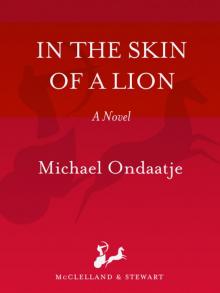 In the Skin of a Lion
In the Skin of a Lion The Cinnamon Peeler
The Cinnamon Peeler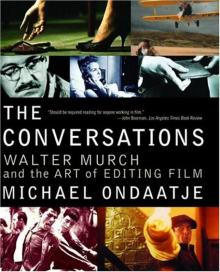 The Conversations: Walter Murch and the Art of Editing Film
The Conversations: Walter Murch and the Art of Editing Film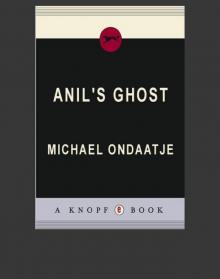 Anil's Ghost
Anil's Ghost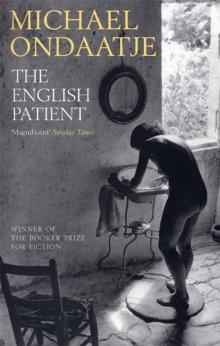 The English Patient
The English Patient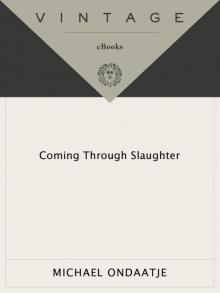 Coming Through Slaughter
Coming Through Slaughter Handwriting
Handwriting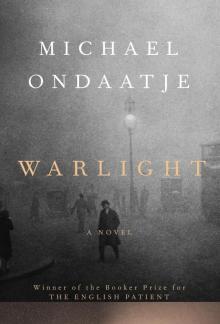 Warlight
Warlight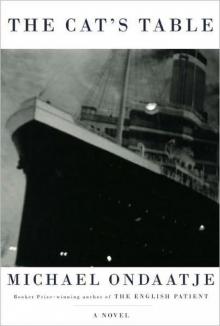 The Cat's Table
The Cat's Table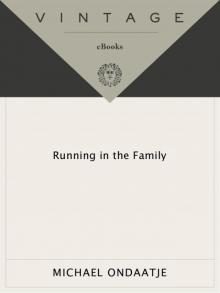 Running in the Family
Running in the Family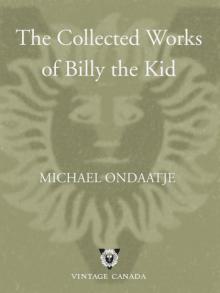 The Collected Works of Billy the Kid
The Collected Works of Billy the Kid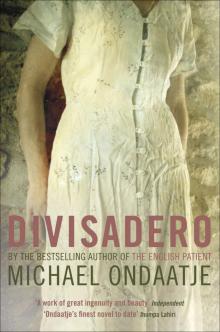 Divisadero
Divisadero